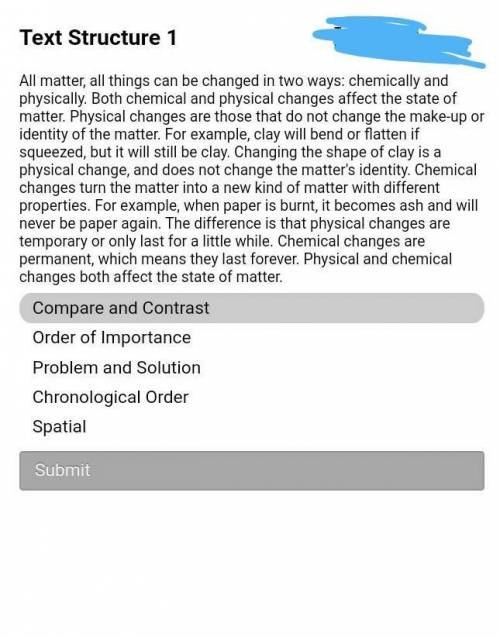
TEXT STRUCTURES
All matter, all things can be changed in two ways: chemically and physically. Both chemical and physical changes affect the state of matter. Physical changes are those that do not change the make-up or identity of the matter. For example, clay will bend or flatten if squeezed, but it will still be clay. Changing the shape of clay is a physical change, and does not change the matter's identity. Chemical changes turn the matter into a new kind of matter with different properties. For example, when paper is burnt, it becomes ash and will never be paper again. The difference is that physical changes are temporary or only last for a little while. Chemical changes are permanent, which means they last forever. Physical and chemical
changes both affect the state of matter.
Compare and Contrast
Order of Importance
Problem and Solution
Chronological Order
Spatial


Answers: 1
Another question on English

English, 21.06.2019 14:30
In which sentence is the action arrow pointing to the receiver of the action? a. sentence: hawkeye tracked the deer through the forest. an arrow, pointing to the left, is drawn above the verb 'tracked'. b. sentence: hawkeye tracked the deer through the forest. an arrow, pointing to the right, is drawn above the verb 'tracked'.
Answers: 2

English, 21.06.2019 16:00
True or false: a writer uses ellipses to indicate an omission or that something has been left out of a direct quote.
Answers: 3

English, 21.06.2019 21:30
Which best describes the suspense technique of flashback? an image, color, object, or similar is shown early in the film. it later reappears in a pivotal scene or plot point. details of the story outside of the chronological storyline are provided to the audience, often as a memory. illusions of explosions and other events are presented, often using computer-generated imagery to seem realistic. the screenwriter lets the audience know something the main character does not, usually something important to the plot.
Answers: 1

English, 22.06.2019 04:00
Excerpt from 100% - the story of a patriot upton sinclair 10 so peter walked along, with his belt drawn tight, and his restless blue eyes wandering here and there, looking for a place to get a meal. there were jobs to be had, but they were hard jobs, and peter wanted an easy one. there are people in this world who live by their muscles, and others who live by their wits; peter belonged to the latter class; and had missed many a meal rather than descend in the social scale. 11 peter looked into the faces of everyone he passed, searching for a possible opening. some returned his glance, but never for more than a second, for they saw an insignificant looking man, undersized, undernourished, and with one shoulder higher than the other, a weak chin and mouth, crooked teeth, and a brown moustache too feeble to hold itself up at the corners. peters' straw hat had many straws missing, his second-hand brown suit was become third-hand, and his shoes were turning over at the sides. in a city where everybody was "hustling," everybody, as they phrased it, "on the make," why should anyone take a second glance at peter gudge? why should anyone care about the restless soul hidden inside him, or dream that peter was, in his own obscure way, a sort of genius? no one did care; no one did dream. 12 it was about two o'clock of an afternoon in july, and the sun beat down upon the streets of american city. there were crowds upon the streets, and peter noticed that everywhere were flags and bunting. once or twice he heard the strains of distant music, and wondered what was "up." peter had not been reading the newspapers; all his attention bad been taken up by the quarrels of the smithers faction and the lunk faction in the first apostolic church, otherwise known as the holy rollers, and great events that had been happening in the world outside were of no concern to him. peter knew vaguely that on the other side of the world half a dozen mighty nations were locked together in a grip of death; the whole earth was shaken with their struggles, and peter had felt a bit of the trembling now and then. but peter did not know that his own country had anything to do with this european quarrel, and did not know that certain great interests throughout the country had set themselves to rouse the public to action. based on the author's characterization of peter in paragraphs 10, 11, and 12, which word best describes him? a) industrious b) loyal c) patriotic d) poor
Answers: 3
You know the right answer?
TEXT STRUCTURES
All matter, all things can be changed in two ways: chemically and physically. Both...
Questions

Mathematics, 28.08.2020 23:01

Mathematics, 28.08.2020 23:01




Biology, 28.08.2020 23:01


Mathematics, 28.08.2020 23:01


English, 28.08.2020 23:01




Biology, 28.08.2020 23:01

Mathematics, 28.08.2020 23:01





History, 28.08.2020 23:01



